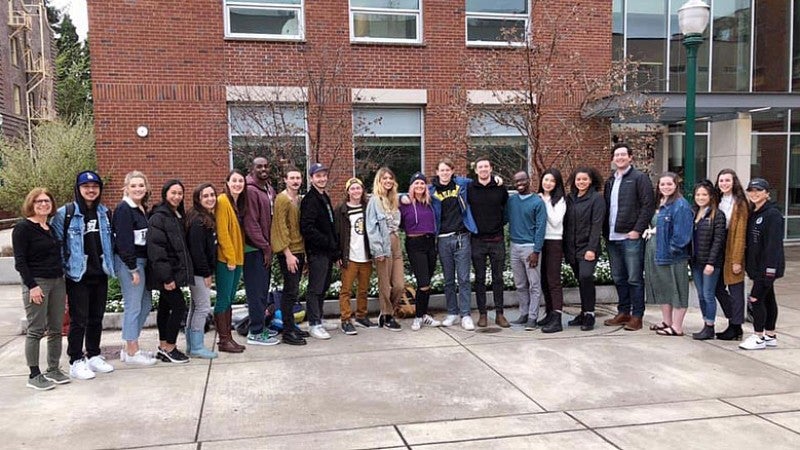
Editor’s note: Each summer, SOJC students travel to Ghana to immerse themselves in hands-on fieldwork. This is the first in a series of posts chronicling the Media in Ghana program through the eyes of student intern C. Francis O’Leary. Check back throughout the summer for more notes from the field.
I have my travel visa. I’ve been inoculated against typhoid and yellow fever and have a bottle full of malaria pills. My wardrobe has been appropriately stocked with slacks and colored shirts. I can introduce myself in Twi.
On one hand, I feel ready to commence my summer internship with the Media in Ghana program. On the other, do I have enough sunscreen? Socks? Batteries?
An old gym partner of mine once said, “You know how to get better at pullups? Just do more pullups.” It’s beyond simple, but this phrase has been helpful throughout my life as I’ve developed new skills. As a nontraditional student, I’ve worked for years in odd jobs, picking up skills as I went. And I’ve found that, for me, nothing is a replacement for experience. With that in mind, I decided to participate in an internship this summer.
It wouldn’t have been too hard to get an internship in Portland or Sacramento, but I prefer to seek experiences that are a little more challenging. I knew I wanted to intern—and I knew I wanted to do it abroad. The Global Education Oregon office has loads of opportunities that fit my requirements, so I set about attending informational meetings on various programs.
After attending the Media in Ghana meeting in fall 2018, I sat down with SOJC Associate Dean Leslie Steeves, the program director, with a list of questions: What was the work week like? How do we commute? What are the living arrangements? By the end of our conversation, she said, “If you apply, you’ll be accepted.” I set my sights on applying to the six-week program.
It seems silly, but one of the things that prevented me from attending college sooner was my fear and hatred of paperwork. GEO requires paperwork. Scholarships require paperwork. The GI Bill requires paperwork. Visa applications require paperwork. An intimidating amount of tedium was laid before me, but, undaunted, I persisted.
Luckily, the staff at the GEO offices really want students to be able to study abroad. In addition to sending regular reminders about deadlines for applications and documentation, the GEO staff hosted workshops on scholarships. For the Gilman Scholarship, GEO staff go so far as to provided editing for applicants’ essays.
It was all worth it. At the end of the process, I had been accepted to the Media in Ghana program and awarded a total of $4,500 in scholarships.
During spring term, the SOJC offers two classes to prepare for the Media in Ghana internship. The one-credit orientation course covers cultural education with a focus on media influence. Each week, three or four program attendees partnered to research and present a topic for discussion. Topics ranged from indigenous cultures to post-colonial media practices. This class also offered an opportunity to ask Steeves any further questions about how to prepare, to meet the other program members and, during one period, to chat with Media in Ghana alumni.
Members may also take a one-credit Self Study Learning Program class on Twi, one of Ghana’s pre-colonial languages. It was important to me to learn what Twi I could as a show of respect. Over the course of the class, I’ve learned enough to politely introduce myself, explain that I’m a student journalist and ask if I can take a photo, among a smattering of other phrases. More important, the class is taught by a Ghanaian man, who was able to more fully round out my understanding of customs and practices, complete with learning how to sing a few children’s songs.
Now, as the countdown to my Ghana trip winds down, I feel there’s nothing more I can do to prepare. Nonetheless, the prospect of studying abroad is daunting. I know I’ll face challenges I’m unfamiliar with, and I’ll probably make a mess of my first introduction in Twi—but I didn’t choose this program because I thought it would be the easiest way to spend my summer.

